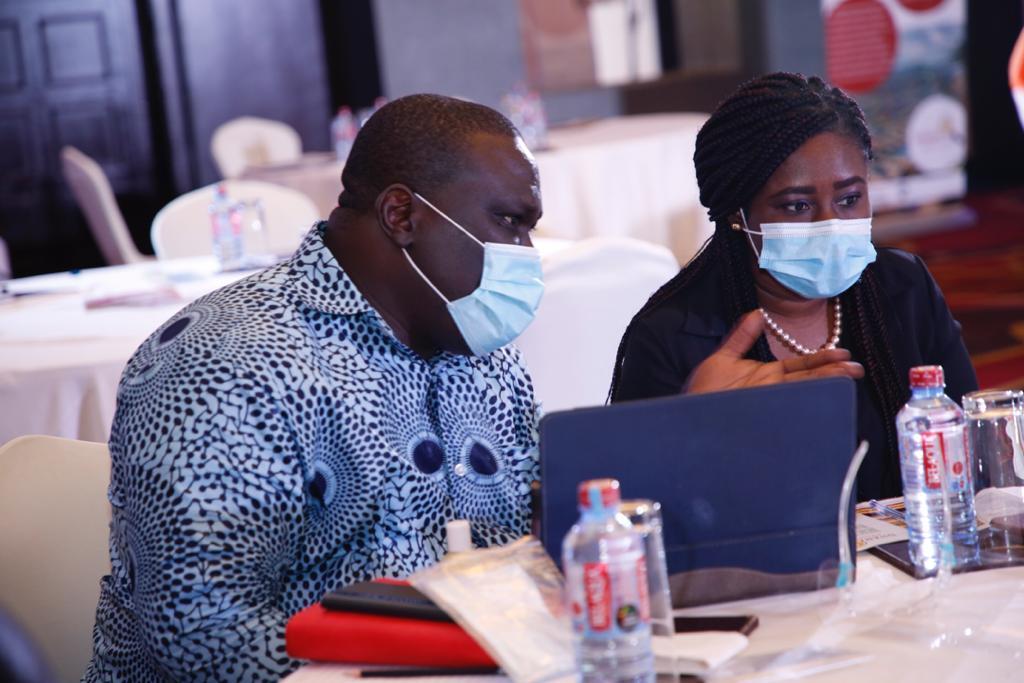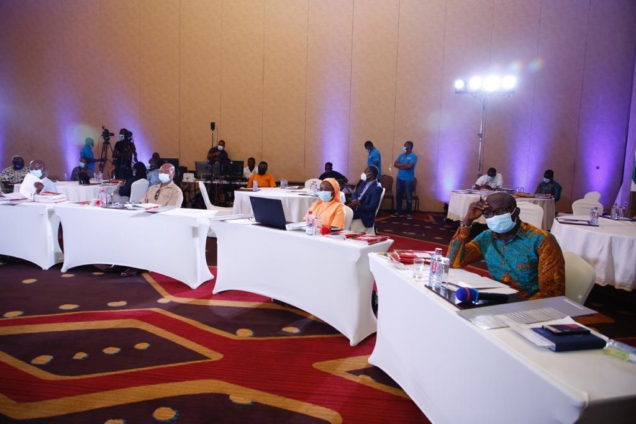
Audio By Carbonatix
The Dean of School of Research and Graduate Studies at GIMPA, Professor Wisdom Akpalu, has said the marine fish stock is being over-exploited.
According to Prof. Akpalu, the activities of artisanal fishers and industrial trawlers are bringing the fish stock to the verge of collapse.
He said the fishing industry contributed substantially to the Ghanaian economy, which employed about three million people and sustained livelihoods, hence the need for urgent redemption measures to avoid ecological collapse and to safeguard sustainable income for artisanal fishers and the entire value chain.
Prof. Akpalu made this statement during a presentation of research findings in Accra on measures to spur economic growth across all sectors of the economy to an eminent panel. This panel will rank all interventions and establish priorities for a prosperous future as part of the "Ghana Priorities" project.
The project is an initiative being spearheaded by the National Development Planning Commission (NDPC) in collaboration with the Copenhagen Consensus Centre, an award-winning international think tank.
Prof. Akpalu proposed three policy interventions; replacing illegal fishing nets, reducing the over 13,000 canoes to 9,000, and providing entrepreneurial skills training and subsidies to fishermen who may lose their sources of livelihoods.

He also called for the installation of video devices in trawl vessels to monitor illegal fishing practices.
He was optimistic that the aforementioned interventions would produce positive returns on investment and improve livelihoods.
The Ghana Priorities project seeks to place premium on the best policies for the country's future based on cost-benefit analysis.
With regards to measures to promote industrial transformation, the Director, Institute of Statistical, Social and Economic Research (ISSER), University of Ghana, Prof. Peter Quartey, outlined some key interventions to boost industrial growth.
He said government and other donor agencies needed to support management consulting services that could significantly improve factory operations and processes in areas such as quality control, human resources, inventory, and sales.
He noted that every cedi spent on improving management practices would bring a return six times higher than the original investment for large enterprises, and almost 10 times higher for medium-sized companies.
Prof. Quartey said medium scale enterprises must have access to credit adding; "Financing for businesses and companies could be promoted in Ghana by ensuring better surveillance of the credit referencing system, better address systems, improving the quality of information available to lenders and enforcing a reward and sanctions regime.”
"These measures would create nearly 12 cedis worth of benefits to society for every cedi spent," Prof. Quartey said.
The renowned economist noted that providing capital grants to selected micro enterprises was estimated to generate benefit seven times higher than the original investment.
The Vice Dean, School of Graduate Studies, UG, Prof Robert Darko Osei, explained that agriculture was a significant contributor to the Ghanaian economy and an important source of employment, with over 40 per cent of the working population engaged in farming.
He said despite growth and development dynamics, which was witnessing gradual shifting away from the agriculture sector towards industry and services, agriculture still formed a crucial part of the Ghanaian economy, and a necessary vehicle for poverty alleviation and ensuring food security.
Prof Osei noted that increasing agricultural output could be achieved through three main mechanisms; increasing arable lands under cultivation, improving crop yield, and reducing post-harvest losses.
Dr Festus Ebo Turkson and Dr Priscilla Twumasi Baffour, both lecturers at the University of Ghana, introduced the pedagogical approach of ‘Teaching at the Right Level,’ which targets instruction to the specific learning needs of children by splitting them into class groups based on learning levels rather than age, for one or two hours per day.
They said the better learning outcomes resulting from this approach would be worth 1.5 per cent of earnings over students’ lives, with every cedi spent generating social benefits worth eight cedis.
The research team that studied the cost/benefit indicators of using improved/certified seeds and fertilizer, irrigation and mechanisation to increase yields, and expanding warehousing capacity to reduce post-harvest losses recommended that subsidising fertiliser would benefit the nation four times than its initial cost.
After hearing presentations from the 28 teams of economists from Ghana and abroad over the course of three days, the Eminent Panel, including Nobel Prize recipient, Finn Kydland and six distinguished national economists, will rank all interventions and establish priorities for a prosperous future.
The Panel will present its findings on Monday, August 10, 2020.
Latest Stories
-
Prince Owusu bemoans lack of goals ahead of Superclash
30 seconds -
Asenso-Boakye blasts gov’t for scaling down Suame Interchange, neglecting Kumasi
7 minutes -
Fidelity to The Law or to The Public: Patricia Asieduwaa vs The Republic. A Test Case for Judicial Independence in Ghana
15 minutes -
GMTF deepens engagement with Holy Family Hospital, Techiman, to expand specialised care
19 minutes -
NDC Regional Chairmen commend GoldBod CEO Sammy Gyamfi during courtesy call
26 minutes -
Ex-NEIP CEO Kofi Ofosu Nkansah’s home searched by NIB over scholarship sale allegations
30 minutes -
Mahama reaffirms Ghana’s commitment to transparency ahead of APRM peer review
41 minutes -
You won’t be left behind – Gender Minister assures unemployed graduates with disabilities of gov’t commitment to jobs
42 minutes -
Former UNAIDS Executive Director urges media to bring NTDs out of the shadows
44 minutes -
Mahama announces phased rollout of nearly $1bn Pwalugu Multipurpose Dam project
48 minutes -
Ghana engages Afreximbank to advance strategic minerals development
57 minutes -
NDC sticks with Baba Jamal for Ayawaso East By-election despite vote-buying probe
1 hour -
Give retired pastors key roles to play in government – Prophet John Anokye
1 hour -
UniMAC External Affairs Officer attends 24th GUPS First General Assembly Meeting
1 hour -
Iran is a threat to Middle East stability – Israeli Ambassador to Ghana
1 hour

